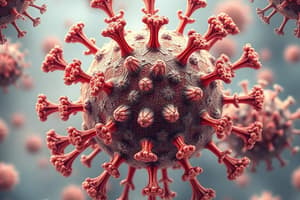Podcast
Questions and Answers
What is the primary purpose of the Exit Exam for Doctor of Pharmacy (PharmD)?
What is the primary purpose of the Exit Exam for Doctor of Pharmacy (PharmD)?
- To evaluate knowledge and skills for professional practice (correct)
- To measure research aptitude in pharmacy sciences
- To determine eligibility for internship programs
- To assess personal motivation for pharmacy practice
Which of the following components is NOT part of the Exit Exam?
Which of the following components is NOT part of the Exit Exam?
- Mock Exams
- Oral Defense (correct)
- Practical/Clinical Examination
- Written Examination
Which content area focuses on patient assessment and medication management?
Which content area focuses on patient assessment and medication management?
- Pharmacology
- Pharmacy Practice
- Clinical Pharmacy (correct)
- Pharmaceutical Chemistry
What is a common strategy for preparing for the Exit Exam?
What is a common strategy for preparing for the Exit Exam?
Why is successful completion of the Exit Exam important?
Why is successful completion of the Exit Exam important?
Flashcards are hidden until you start studying
Study Notes
Overview of Exit Exam for Doctor of Pharmacy (PharmD)
-
Purpose:
- Assess knowledge and skills acquired during PharmD program.
- Ensure readiness for professional practice and licensure.
-
Components:
- Written Examination:
- Multiple-choice questions covering pharmaceutical sciences, clinical pharmacy, pharmacotherapy, and pharmacy law.
- Practical/Clinical Examination:
- Objective Structured Clinical Examinations (OSCE) to evaluate practical skills in patient care and communication.
- Written Examination:
-
Content Areas:
- Pharmacology:
- Mechanisms of action, therapeutic uses, side effects, and drug interactions.
- Pharmaceutical Chemistry:
- Drug formulation, stability, and delivery systems.
- Pharmacy Practice:
- Ethics, legal issues, and professional conduct.
- Clinical Pharmacy:
- Patient assessment, medication management, and pharmacotherapy recommendations.
- Pharmacology:
-
Preparation Strategies:
- Review Course Materials:
- Textbooks, lecture notes, and relevant research articles.
- Practice Questions:
- Utilize previous exams and test banks for familiarization with question formats.
- Study Groups:
- Collaborate with peers for discussion and clarification of complex topics.
- Mock Exams:
- Simulate exam conditions to build confidence and time management skills.
- Review Course Materials:
-
Passing Criteria:
- Specific minimum score required, often set by respective schools or regulatory bodies.
- May include both written and practical components; passing both is typically necessary.
-
Importance:
- Successful completion is often a prerequisite for graduation and obtaining a pharmacy license.
- Reflects competency in the knowledge and skills essential for pharmacy practice.
-
Post-Exam:
- Results may influence residency opportunities and job prospects.
- Areas of weakness identified can guide further study and professional development.
Overview of Exit Exam for Doctor of Pharmacy (PharmD)
- Purpose:
- Evaluates the comprehensive knowledge and skills developed throughout the PharmD program.
- Ensures graduates are prepared for professional practice and licensure in pharmacy.
Components
-
Written Examination:
- Consists of multiple-choice questions addressing key areas including pharmaceutical sciences, clinical pharmacy, pharmacotherapy, and pharmacy law.
-
Practical/Clinical Examination:
- Features Objective Structured Clinical Examinations (OSCE) to assess practical skills such as patient care and communication.
Content Areas
-
Pharmacology:
- Covers mechanisms of action of drugs, therapeutic uses, possible side effects, and drug interactions.
-
Pharmaceutical Chemistry:
- Focuses on principles of drug formulation, stability, and delivery systems in pharmacy practice.
-
Pharmacy Practice:
- Encompasses ethical considerations, legal aspects, and professional behavior expected in the pharmacy field.
-
Clinical Pharmacy:
- Involves skills in patient assessment, effective medication management, and making pharmacotherapy recommendations.
Preparation Strategies
-
Review Course Materials:
- Engage thoroughly with textbooks, lecture notes, and pertinent research articles to reinforce understanding.
-
Practice Questions:
- Work through past exams and test banks to become familiar with question formats and topics covered.
-
Study Groups:
- Join collaboration sessions with peers to discuss and clarify difficult concepts and enhance learning outcomes.
-
Mock Exams:
- Conduct practice exams under timed conditions to enhance confidence and improve time management skills.
Passing Criteria
- Specific minimum scores are determined by individual schools or regulatory bodies, and are required for both written and practical assessments.
- Achieving passing marks in both components is usually mandatory for successful exam completion.
Importance
- Completing the exit exam is crucial for graduation and for obtaining a pharmacy license.
- It serves as a demonstration of competence in essential pharmacy practice skills and knowledge.
Post-Exam
- Exam results may impact residency placements and future job opportunities.
- Identifying weaknesses in knowledge areas can guide ongoing study efforts and professional development initiatives.
Studying That Suits You
Use AI to generate personalized quizzes and flashcards to suit your learning preferences.



